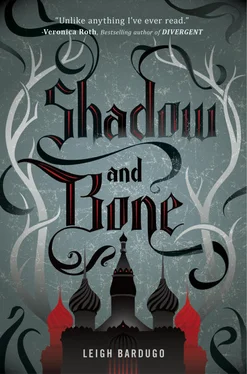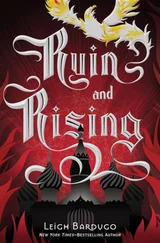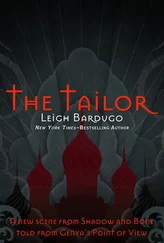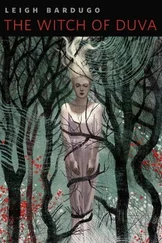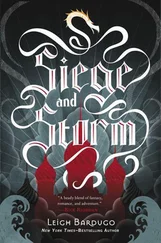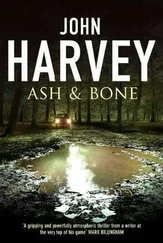But if I understood what we did, I was less sure of how we did it. The grounding principle of the Small Science was “like calls to like,” but then it got complicated. Odinakovost was the “thisness” of a thing that made it the same as everything else. Etovost was the “thatness” of a thing that made it different from everything else. Odinakovost connected Grisha to the world, but it was etovost that gave them an affinity for something like air, or blood, or in my case, light. Around then, my head started swimming.
One thing did stand out to me: the word the philosophers used to describe people born without Grisha gifts, otkazat’sya, “the abandoned.” It was another word for orphan.
LATE ONE AFTERNOON, I was plodding through a passage describing Grisha assistance with trade routes when I felt someone’s presence beside me. I looked up and cringed back in my chair. The Apparat was looming over me, his flat black pupils lit with peculiar intensity.
I glanced around the library. It was empty except for us, and despite the sun pouring through the glass ceiling, I felt a chill creep through me.
He sat down in the chair beside me with a gust of musty robes, and the damp smell of tombs enveloped me. I tried to breathe through my mouth.
“Are you enjoying your studies, Alina Starkov?”
“Very much,” I lied.
“I’m so glad,” he said. “But I hope you will remember to feed the soul as well as the mind. I am the spiritual adviser to all those within the palace walls. Should you find yourself worried or in distress, I hope you will not hesitate to come to me.”
“I will,” I said. “Absolutely.”
“Good, good.” He smiled, revealing a mouth of crowded, yellowing teeth, his gums black like a wolf ’s. “I want us to be friends. It is so important that we are friends.”
“Of course.”
“I would be pleased if you would accept a gift from me,” he said, reaching into the folds of his brown robes and removing a small book bound in red leather.
How could someone offering you a present sound so creepy?
Reluctantly, I leaned forward and took the book from his long, blue-veined hand. The title was embossed in gold on the cover: Istorii Sankt’ya.
“The Lives of Saints ?”
He nodded. “There was a time when all Grisha children were given this book when they came to school at the Little Palace.”
“Thank you,” I said, perplexed.
“Peasants love their Saints. They hunger for the miraculous. And yet they do not love the Grisha. Why do you think that is?”
“I hadn’t thought about it,” I said. I opened the book. Someone had written my name inside the cover. I flipped a few pages. Sankt Petyr of Brevno. Sankt Ilya in Chains. Sankta Lizabeta. Each chapter began with a full-page illustration, beautifully rendered in brightly colored inks.
“I think it is because the Grisha do not suffer the way the Saints suffer, the way the people suffer.”
“Maybe,” I said absently.
“But you have suffered, haven’t you, Alina Starkov? And I think… yes. I think you will suffer more.”
My head jerked up. I thought he might be threatening me, but his eyes were full of a strange sympathy that was even more terrifying.
I glanced back down at the book in my lap. My finger had stopped on an illustration of Sankta Lizabeta as she had died, drawn and quartered in a field of roses. Her blood made a river through the petals. I snapped the book closed and sprang to my feet. “I should go.”
The Apparat rose, and for a moment I thought he would try to stop me. “You do not like your gift.”
“No, no. It’s very nice. Thank you. I don’t want to be late,” I babbled.
I bolted past him through the library doors, and I didn’t take an easy breath until I was back in my room. I tossed the book of Saints into the bottom drawer of my dressing table and slammed it shut.
What did the Apparat want from me? Had his words been meant as a threat? Or as some kind of warning?
I took a deep breath, a tide of fatigue and confusion washing over me. I missed the easy rhythm of the Documents Tent, the comforting monotony of my life as a cartographer, when nothing more was expected of me than a few drawings and a tidy worktable. I missed the familiar smell of inks and paper. Mostly, I missed Mal.
I’d written to him every week, care of our regiment, but I hadn’t heard anything back. I knew the post could be unreliable and that his unit might have moved on from the Fold or might even be in West Ravka, but I still hoped that I would hear from him soon. I’d given up on the idea of him visiting me at the Little Palace. As much as I missed him, I couldn’t bear the thought of him knowing that I fit into my new life about as well as I’d fit into my old one.
Every night, as I climbed the stairs to my room after another pointless, painful day, I would imagine the letter that might be waiting for me on my dressing table, and my steps would quicken. But the days passed, and no letter came.
Today was no different. I ran my hand over the empty surface of the table.
“Where are you, Mal?” I whispered. But there was no one there to answer.
WHEN I THOUGHT things couldn’t get any worse, they did.
I was sitting at breakfast in the domed hall when the main doors blew open and a group of unfamiliar Grisha entered. I didn’t pay them much attention. Grisha in the Darkling’s service were always coming and going at the Little Palace, sometimes to recover from injuries received at the northern or southern front, sometimes on leave from other assignments.
Then Nadia gasped.
“Oh no,” groaned Marie.
I looked up and my stomach lurched as I recognized the raven-haired girl who had found Mal so fascinating back in Kribirsk.
“Who is she?” I whispered, watching the girl glide among the other Grisha, saying her hellos, her high laugh echoing off the golden dome.
“Zoya,” muttered Marie. “She was a year ahead of us at school and she’s horrible.”
“Thinks she’s better than everyone,” added Nadia.
I raised my eyebrows. If Zoya’s sin was snobbery, then Marie and Nadia had no business making judgments.
Marie sighed. “The worst part is that she’s kind of right. She’s an incredibly powerful Squaller, a great fighter, and look at her.”
I took in the silver embroidery on Zoya’s cuffs, the glossy perfection of her black hair, the big blue eyes fringed by impossibly dark lashes. She was almost as beautiful as Genya. I thought of Mal and felt a pang of pure jealousy shoot through me. But then I realized that Zoya had been stationed at the Fold. If she and Mal had… well, she might know if he was there, if he was all right. I pushed my plate away. The prospect of asking Zoya about Mal made me a little nauseated.
As if she could feel my stare, Zoya turned from where she was chatting with some awestruck Corporalki and swept over to the Summoners’ table.
“Marie! Nadia! How are you?”
They stood to hug her, their faces plastered with huge, fake smiles.
“You look amazing, Zoya! How are you?” gushed Marie.
“We missed you so much!” squealed Nadia.
“I missed you, too,” Zoya said. “It’s so good to be back at the Little Palace. You can’t imagine how busy the Darkling’s kept me. But I’m being rude. I don’t think I’ve met your friend.”
“Oh!” Marie exclaimed. “I’m so sorry. This is Alina Starkov. The Sun Summoner,” she said with a little pride.
I stood up awkwardly.
Zoya swept me into an embrace. “It’s such an honor to finally meet the Sun Summoner,” she said loudly. But as she hugged me she whispered, “You stink of Keramzin.”
Читать дальше
